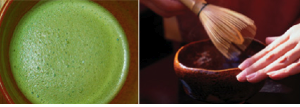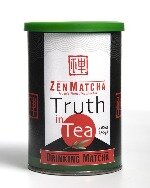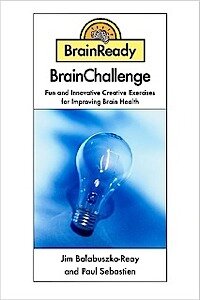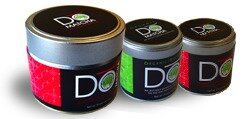We've all heard the hype about green tea being good for us, which also helps explain the unprecedented recent explosion of green tea drinks, foods, supplements, even deserts.
But don't be fooled by clever back-of-bottle marketing such as, "Now with EGCG!" or the overused, "Contains green tea antioxidants!"....which makes it sounds like literally anything containing a microscopic amount of low-grade green tea extract is going to give you the kind of health benefits that true high-quality, whole-leaf, shade-grown, fresh Tencha-grade green tea can provide.
Not even close, no contest: imagine the difference between drinking water containing a small amount of old, processed, diluted orange juice-derived flavoring, compared to eating a...well, a whole organic orange, and the you get the idea.
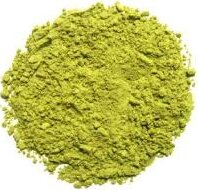
Fortunately, more and more people are learning what many in Japan have known for centuries: to get the full benefits of the amazing green tea plant, the maximum impact, you have to "get the best and drink it whole": Matcha. Real, ceremonial-grade, Japanese Matcha.
And now that Matcha is finally starting to become available in the West, we may be at the very early rumblings of a Matcha Revolution -- based on the research and reported health benefits from this incredible green powder.
What is Matcha?
Real Matcha is the very high-quality, stone-ground powdered form of select shade-grown Japanese green tea leaves. It's like regular green tea on steroids, and then some: rather than just drinking green tea leaf-infused water, when you consume Matcha, you're actually getting the whole green tea leaf, and a very high quality green tea leaf at that (real Matcha is shade-grown, carefully prepared, hand-picked Tencha-grade), so you're drinking the full benefits of the best of the green tea leaf itself.
Countless studies over the years have illustrated the health benefits of green tea, and recently it seems like there's an explosion of new green tea findings: from lowering your risk of stroke to lowering cholesterol to fighting cancer to fighting cavities and gum disease to increasing mental clarity without the jittery effects of coffee. The list of potential benefits seems endless (we encourage you to do some research yourself...the massive list of researched health benefits is staggering).

But here's the amazing thing that many don't know: high-grade Matcha green tea in particular is exponentially more powerful than regular brewed green teas, so it's like amplifying all of these wonderful health and mental benefits in as little as one comparative serving. For example, Matcha green tea has approximately 70 times the antioxidants of orange juice, even higher than blueberries, and its unique EGCG catechin element (the subject of much current research) is one of the most powerful immune-boosting and anti-cancer substances known.
And guess what? Matcha green tea contains approximately 137 times the amount of EGCG as regular steeped green tea. Wow!
Imagine what that does to your brain and body if you drink it every day.
Of course, there's no one single cure all "superfood" that you should take at the expense of an overall healthy diet. Yet, you do have to wonder why the Japanese (particularly ritualistic Matcha-drinkers) seem to live longer than people elsewhere. And just how those Japanese monks are able to focus and concentrate intensely for 12-hour marathon meditation sessions. Maybe it's because they always drink matcha at the beginning of these sessions? Matcha is an integral, interwoven part of the religion, the meditation and ceremonies.
And they've been doing it for over 800 years.
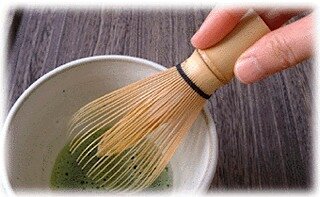
But there are numerous other health benefits that you might not know about: several studies have shown it possess anti-viral and antibiotic properties, which assist with everything from digestion to killing harmful bacteria to helping prevent colds and flus. It increases your mental alertness and sharpness while also providing an almost meditative focusing, calming quality, which explains just why those monks in Asia have consumed Matcha religiously (pun intended), for over 800 years right before their long meditation sessions and ceremonies. It also has a naturally high vitamin C, flouride and chlorophyl content, among other vitamins and minerals, and nine times the beta carotene of spinach.
The list goes on, and we could go on. What else can we say other than it's good stuff.
So where to find Matcha? Good news, finally...
Fortunately, thanks to the recent health discoveries about Matcha combined
with increased awareness and outright demand in the West, a couple companies have now made it possible to get real Japanese high-grade Matcha outside of Japan.
But be warned: not all products labeled "Matcha" or "green tea powder" are real, true, high-quality shade-grown properly prepared tencha-based Matcha! The importance of the quality and sourcing cannot be overstated: some are just ground low-quality Sencha or Bancha leaves, some even add coloring or flavoring or sweeteners...even MSG! YUCK!
Luckily, we've discovered two top-notch companies that supply ultra-premium quality Matcha sourced directly from Japan (yes, the same ceremonial-grade Matcha as previously only available to the elite in Japan) and made available to those in the U.S., Canada, and soon beyond...
DōMatcha offers organic ceremonial grade and non-organic ceremonial grade Matcha, as well as a larger-sized (and more economical) "2nd Harvest grade", Gen-mai cha tea bags and Ten-cha tea bags, plus all the accessories such as traditional authentic Matcha whisks and bowls.
Before we forget: using a real Matcha whisk makes a huge difference in the frothiness and the taste! It's worth the investment, and consider that anyone in Japan making real Matcha uses a traditional whisk...it's the only way to do it right.
When we first heard about DōMatcha, we decided to contact them to find out who they were, their background and Matcha sourcing method. We were amazed to discover that they are a company whose trading partnership with Japan goes back 200 years! Talk about longevity. Great people, passionate about Matcha and committed to sourcing the highest quality, ceremony-grade Matcha available...directly from an ancient, prestigious source in Japan.
After tasting all three of their Matcha offerings (organic, non-organic and 2nd Harvest), we can confirm that this is the real deal. You can check out their story on their
new web site here, or contact Calli at for more info & ordering (use their toll-free phone number to order for now, until their online ordering is online...).
The other great Matcha provider in the West is
Zen Matcha Tea -- that's right, now there are at least two great sources for real high-grade Japanese Matcha (
http://www.zenmatchatea.com)
The people behind Zen Matcha Tea really know their tea as well, and clearly care about the health of their customers based on discussions with founder Naomi Thomas. They are extremely passionate about
Matcha and making it available, and now offer a ceremonial 'premium' grade, a 'drinking Matcha' grade, and a 'mixing Matcha' grade for baking/cooking, all available online-only via their web site, so check them out at
http://www.zenmatchatea.com or you can contact Naomi directly at
Give Matcha a try, it's simply amazing stuff...we drink Matcha daily here at BrainReady, and are sure that once the word gets out about the health benefits of this REAL high-grade Japanese Matcha, we may likely see a new green tea health revolution indeed. You heard it here first on BrainReady... :)
(And if you try DōMatcha or Zen Matcha, please tell them that you heard about them via BrainReady, as they're both interested in how people are hearing about Matcha...particularly those interested in brain health!)
Discover the power of Matcha for yourself, and be sure to let us know what YOU think about it...discuss it below!
